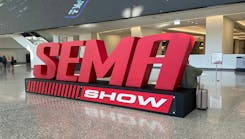Climate-friendly A/C service with MAHLE ArcticPRO service equipment
Refrigerant leaking from air conditioning systems compromises the environment. To minimize losses during operation and service, the new generation of MAHLE Aftermarket A/C service units not only have an automatic leakage test function, they are also available with special connector couplings that completely eliminate the risk of escaping refrigerant. Refrigerant analysis units from MAHLE Aftermarket also recognize all common types of refrigerants, making it possible to recycle them by type.
The E3 technology in MAHLE A/C service units is based on three components. With the patented E3 fill process, the air conditioning system can be filled regardless of vehicle and ambient temperature. With the E3 pump, the internal cleansing process for the vacuum pump, oil change intervals can be extended to up to 1,000 operating hours—an increase of tenfold. This means that the annual oil change no longer applies, with the benefit of shorter service times and lower costs. Thanks to the third component, the patented E³ connect couplings, the refrigerant can be fully recovered from hoses and service fittings.
“MAHLE’s A/C service units are now helping to make A/C service at workshops more safe, economical, and eco-friendly,” says Olaf Henning, Corporate Executive Vice President and General Manager MAHLE Aftermarket.
With its latest generation of A/C service units, MAHLE Aftermarket is not only protecting the environment, but also expanding its range for workshop connectivity: Using a smartphone app, workshop technicians can view the workflows and unit status, and automatically order a service when needed. The ASA interface on the unit and the integration of the unit in the workshop network ensure fast data exchange. The large touch screen, which is standard on all units, provides a continuous display of all information and programmed procedures, as well as the current status. A quick-start can be initiated at any time. The service technician can continue to work on the vehicle while automatic software updates are performed in the background via Wi-Fi. Possible leaks in the air conditioning system are quickly detected with nitrogen or forming gas via a direct connection to the air conditioner. For a time-saving service, the devices can be serviced remotely via Wi-Fi: workshops can thus obtain fast support directly on the unit.



